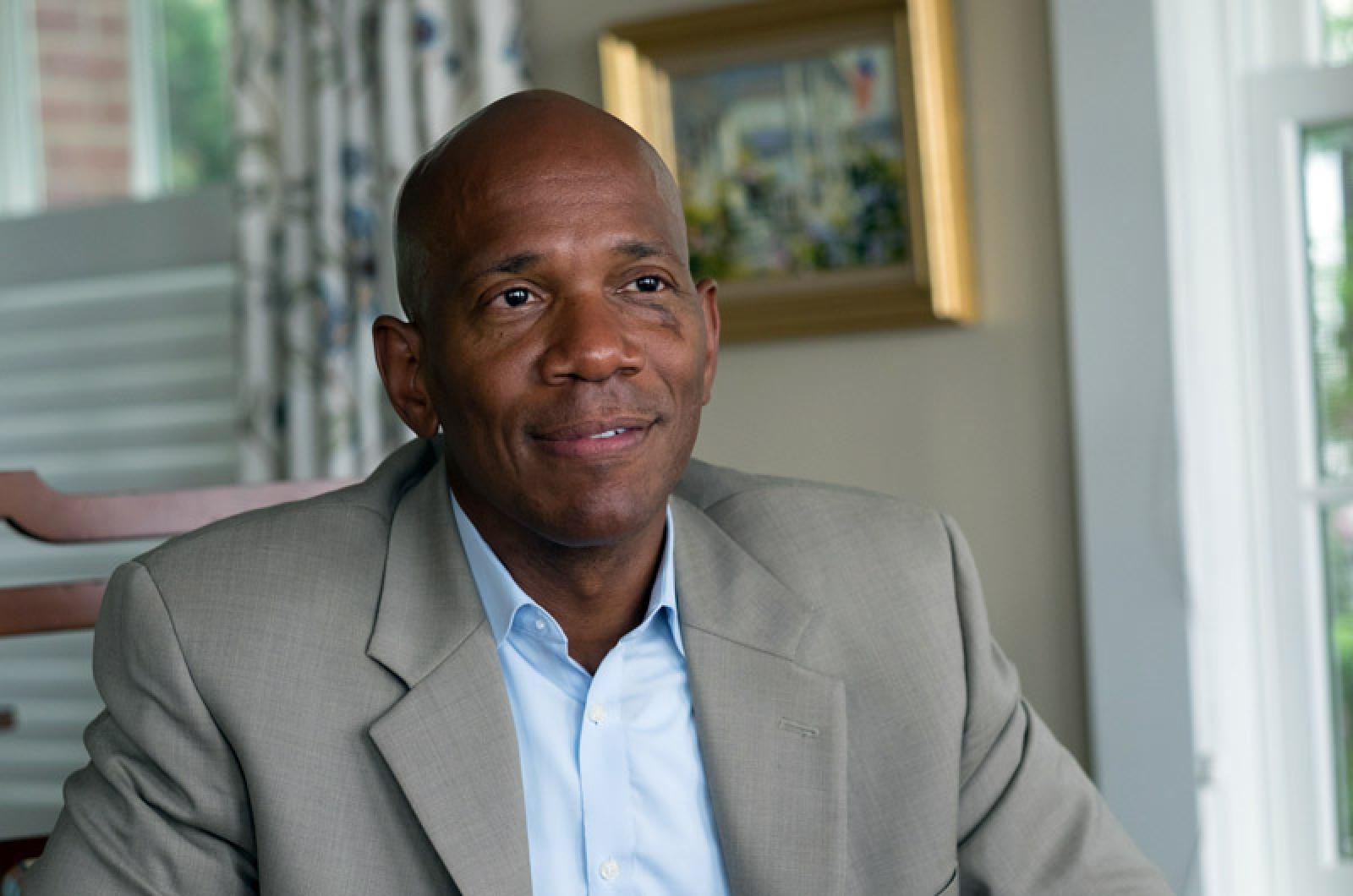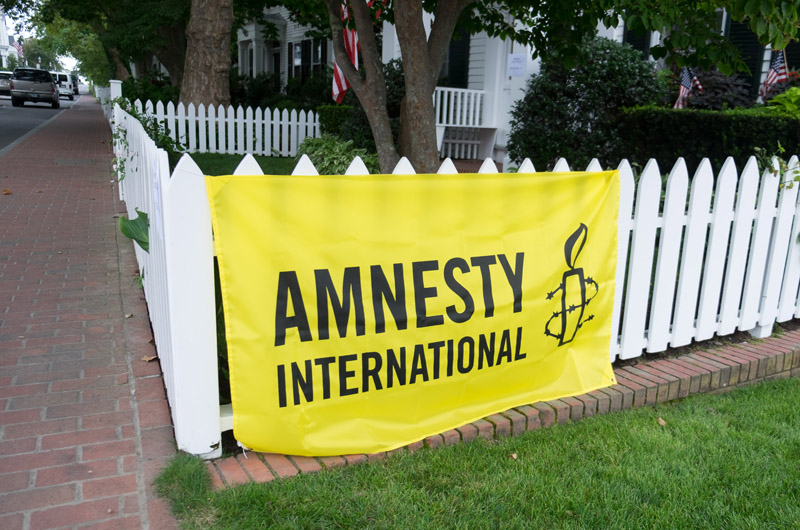On Saturday evening, a yellow banner hung from a picket fence out on Starbuck’s Neck. As people strolled by, between the Edgartown Lighthouse and downtown, some noticed the words Amnesty International and the simple outline of a candle encircled by barbed wire — a widely recognized symbol of hope in the face of human rights abuses.
Inside the house, owned by Kathy and Ed Ludwig, a ballgame murmured quietly on a wide-screen television. Steven Hawkins, executive director of Amnesty International USA, sat calmly, overlooking the outer harbor and a large white tent on the lawn where people were gathering for a reception later that evening.
Mr. Hawkins had recently moderated an annual forum on the Vineyard hosted by the Charles Hamilton Houston Institute for Race and Justice at Harvard. The topic of the forum — attended by hundreds at the Martha’s Vineyard High School last Wednesday — was criminal justice reform, something Amnesty has added to its agenda following the death of Michael Brown and others at the hands of police last year.
About 40 people were expected to attend the annual reception on Saturday, including longtime Islanders and Amnesty supporters Rose Styron and Bill Shipsey, and a number of newcomers. Just prior to welcoming the crowd and providing an update on the year’s activities, Mr. Hawkins spoke with the Gazette about his work, especially as it relates to criminal justice reform.
Amnesty USA’s investigation into domestic policing over the last year revealed widespread noncompliance with international standards and led to a detailed report pressing for changes at the federal and state levels.
“It certainly has led to a number of public engagements,” Mr. Hawkins said of the efforts. Charles Ogletree, director of the Charles Hamilton Houston Institute, had been unable to moderate the forum Wednesday since it interfered with his 40th wedding anniversary, and had asked Mr. Hawkins to take his place.
Several public discussions on the Vineyard this summer have focused on criminal justice reform, many touching on the importance of narrative, a pillar of Amnesty’s work over the decades.
“One page of a well-told story is worth 20 pages of data,” Mr. Hawkins said, describing the organization’s work to reveal human rights abuses. “The importance of telling the human story, the experiences of human rights defenders, is absolutely critical to a public’s understanding and appreciation for what’s happening around the world.”
Amnesty’s work now includes campaigns related to sexual and reproductive rights, state abuses of power and abolishing the death penalty, and protecting individuals at risk. The group is also working to engage the global arts community to help spread its message and reach more young people. Its report on the use of deadly force by police in the United States found, among other things, that all 50 states and Washington, D.C., fail to comply with international standards. Nine states, including Massachusetts, have no laws related to the use of deadly force by law enforcement officers.
One role Amnesty has played in the criminal justice reform efforts has been to broaden the discussion. The report draws attention to the many police killings that have not made national headlines in the last three years. While records are lacking, estimates range from 400 to 1,000 deaths per year, not all caused by firearms. The report calls for legislation and other steps to bring domestic policing in line with international standards.
During Wednesday’s forum, Mr. Hawkins noted that police departments across the country have become militarized. He asked the five panelists how people can prevent the rest of the world from following our example.
Panelists stressed the need for clear goals so that change can be realized at home, and pointed to the power of stories to give voice to disadvantaged communities. But they also noted that narrative is often used to convince people that change is impossible.
“We need to fight that narrative with everything we have,” said Daniel Beaty, an artist and activist who sat on the second of two panels during the day.
Many of the people Amnesty has helped free from jail or save from execution were themselves artists and story tellers. People who can tell the human story and expose abuses “become some of the biggest threats to the state,” Mr. Hawkins said.
Another connection between Amnesty and civil rights activism is the way in which digital technology has changed the playing field.
“Technology has certainly allowed us to get the message out quicker, to tell the stories to a broader audience,” Mr. Hawkins said. But at the same time, people who spread their message online can face harsh reprisals. Mr. Hawkins pointed to the example of Raif Badawi, a Saudi Arabian blogger who was sentenced to up to 1,000 lashes for urging political reforms in his country. “I imagine as story telling goes into the digital space, we’re going to see more human rights defenders who fall within that category.”
With seven million members in 70 countries, Amnesty is the world’s largest grassroots human rights organization. “Our capacity to build human rights constituencies across the globe is what I think people appreciate about Amnesty,” Mr. Hawkins said. He spoke of a “cluster of support” on the Vineyard that turns out every summer for the annual receptions. Amnesty now hopes to expand its membership to 25 million in the next five years.
Activist and organizer DeRay Mckesson pointed out at the forum Wednesday that protesters in Ferguson, Mo., where Michael Brown was shot, have drawn attention to the issue of criminal justice, but victory remains elusive. Protests are essential in creating the space where change can occur, he said, but lasting solutions may rely on different people with different skills.
Mr. Hawkins framed success mainly as a matter of perseverance. Even when the cameras stop rolling, he said, Amnesty is still there.
“Yes, you have to seize moments, but then you also have to stay tenacious,” he said. “That’s the only way change happens. That has certainly been our experience.”





Comments
Comment policy »